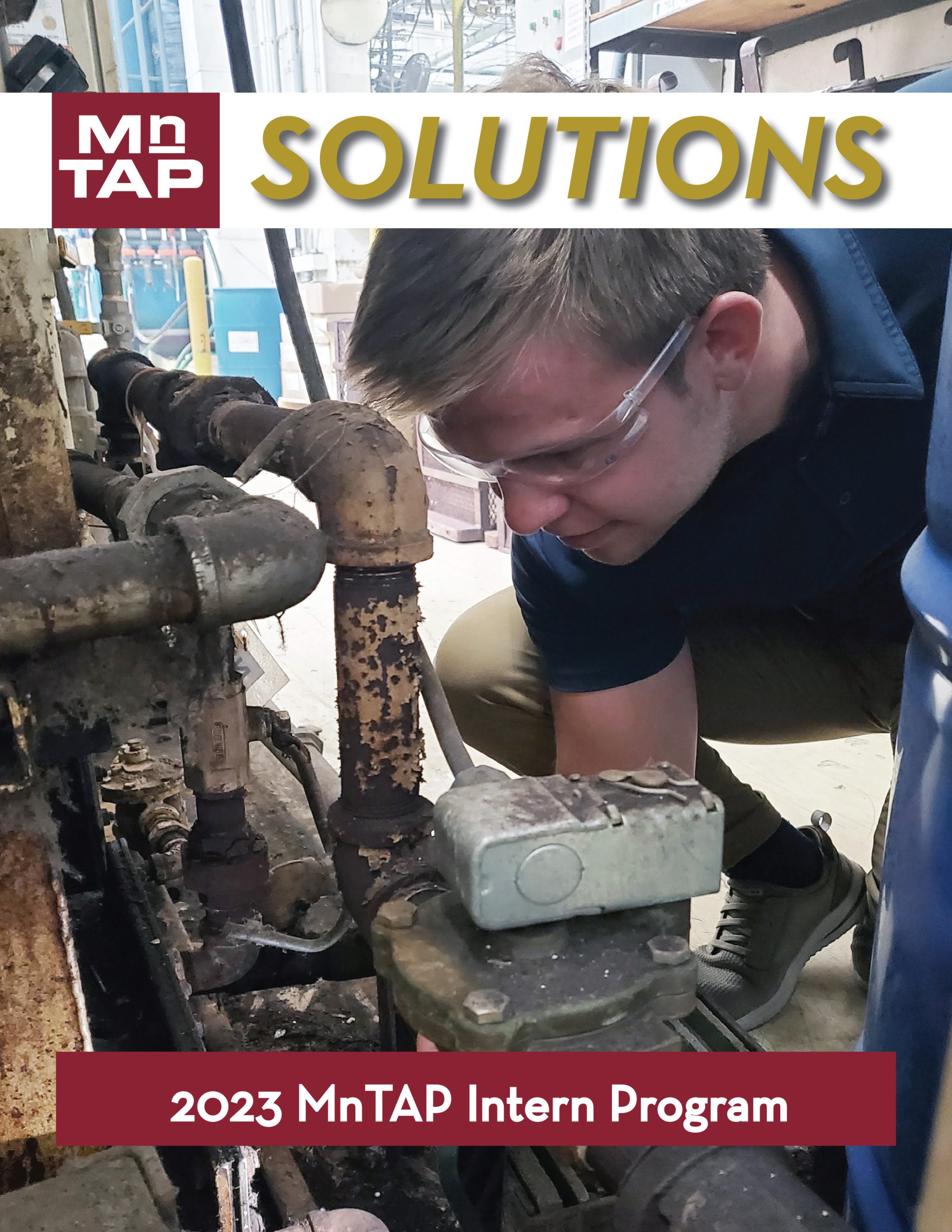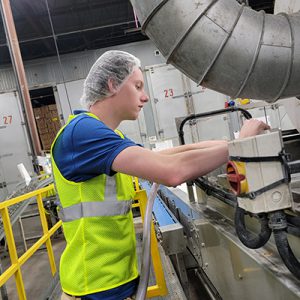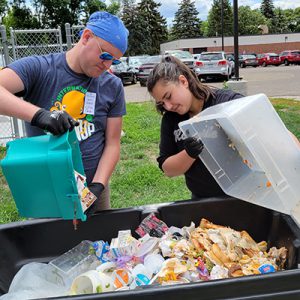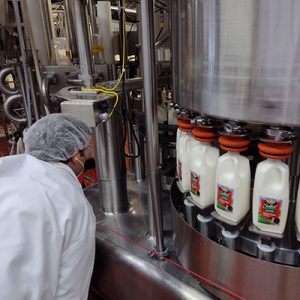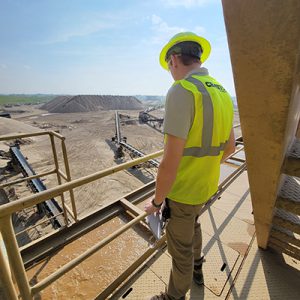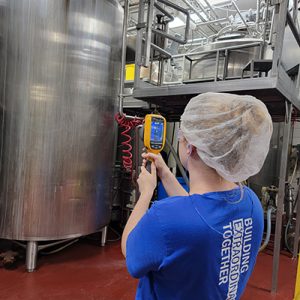November 2023
Inside the Newsletter:
2023 Solutions | Water Efficiency Projects | Waste Reduction Projects | Energy Saving Projects
2023 Solutions for Minnesota Businesses!
MnTAP is proud to announce the publication of 2023 Solutions. This annual report highlights the results from our summer internship program. This year, our group of 17 talented and industrious interns identified environmental reductions and process improvements that could save their companies:
- 68,000,000 gallons of water, saving $542,000
- 1,240,000 kWh electricity, saving $156,000
- 718,000 therms of energy, saving $572,000
- 3,600,000 pounds of waste, saving $729,000
- 80,100 pounds of chemicals, saving $133,000
Combined, these reductions have the potential to save companies $2,132,000 annually!
These results translate into real environmental impacts equivalent to eliminating CO2 emissions from 800 passenger vehicles and powering 130 Minnesota homes. Saving water equivalent to the water use for approximately 3,000 Minnesota residents and eliminating 160 55-gallon drums of chemical use.
We hope that as you read about the 2023 MnTAP intern projects and the results achieved, you will be inspired to contact MnTAP to learn how your company can benefit from having an intern at your site to maximize resource efficiency, increase energy efficiency, reduce costs, and prevent pollution.
Now is the Time to Apply for YOUR 2024 Intern!
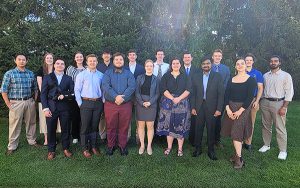 The MnTAP intern program pairs manufacturing, food processing, hospitality and other facilities in Minnesota with a college student who researches and recommends water conservation, energy efficiency and pollution prevention solutions. MnTAP interns have helped identify opportunities that save participating companies millions of dollars annually.
The MnTAP intern program pairs manufacturing, food processing, hospitality and other facilities in Minnesota with a college student who researches and recommends water conservation, energy efficiency and pollution prevention solutions. MnTAP interns have helped identify opportunities that save participating companies millions of dollars annually.
If your company could use another set of eyes to achieve similar results, now is the time to start thinking about developing a project for the summer of 2024. We anticipate supporting 15-18 projects that could focus on water conservation, energy efficiency, paint efficiency, solid waste, and pollution prevention.
Applications are currently being accepted and will be reviewed upon receipt. Companies will be contacted by MnTAP technical staff within two weeks for additional project development and scoping. Although applications are accepted through January 2024, companies are encouraged to apply by the end of 2023 to provide enough time to scope a well-defined project at their facilities.
For more information about the intern program or the application process, visit the MnTAP Intern Program webpages for Businesses. Use the Apply link to go directly to our project proposal form.
For More Information, Contact:
Matt Domski – Intern Program Manager
612-624-5119
mdomski@umn.edu
Water Efficiency Projects
The impacts of consuming water can add up quickly for companies, given that the true cost of water encompasses more than just paying for water supply. Processes such as purification, heating and cooling, as well as pumping and discharge pre-treatment can all have an impact on a company’s bottom line. With economic and environmental impacts in mind, 2023 interns identified ways to conserve more water through facility maintenance, upgrading to more efficient equipment, and process modification solutions.
Lucas Clark Burnette
Civil & Environmental Engineering – University of Minnesota Twin Cities
This summer, Lucas worked at Avtec Finishing Systems, a metal finishing facility located in New Hope, MN. One focus of his project involved optimizing rinse tank procedures through conductivity controls. Conductivity is a measurement that can be used to estimate the quality of water. By implementing conductivity controls for rinses, Avtec staff can regulate the flow of water to rinse tanks by automatically adding fresh water and flushing contaminated water once a certain, pre-determined conductivity set point is reached. This enables water to only be used when it is needed, resulting in water savings of over 3 million gallons and $45,200 in cost savings.
Thomas Leibert
Chemical Engineering – University of Wisconsin Madison
Wholesale Produce Supply Company of Minneapolis, MN, is a processor and wholesaler of fruits and vegetables for retailers across 9 states in the Midwest and parts of Canada. The facility operates 7 days a week and uses water for a variety of processes like product washing and equipment sanitation. By assessing these processes, Thomas identified improvement opportunities which included solutions for better water management. Improvements such as more efficient spray nozzles and metal guarding help reduce over 840,000 gallons of water per year, saving almost $10,000.
Waste Reduction Projects
Waste streams can vary widely across industries, as can the approaches to identifying source reduction and diversion solutions. MnTAP Interns investigated a variety of waste sources in 2023, with some key similarities across projects. Multiple interns tackled food waste opportunities in the healthcare and grocery industries by completing waste audits, sorts and working closely with facility staff and vendors. Along with food, source reduction and diversion opportunities were identified for other waste streams such as manufacturing by-products, wastewater sludge, and vapor degreasing chemical. Minimizing waste is not only good for our communities and the environment, it also has potential to save businesses money through reduced purchasing, processing and disposal costs.
Olivia D’Sousa
Industrial & Systems Engineering – University of Minnesota Twin Cities
This summer Olivia worked at Allina Health’s Mercy Hospital – Unity Campus in Fridley, MN. She was tasked with investigating food waste opportunities associated with back-of-house and patient nutrition operations. By analyzing waste data through existing tracking systems, as well as conducting waste sorts, Olivia was able to quantify and summarize potential solutions. A key recommendation involved using hospital admittance numbers to estimate patient food demand. By estimating demand, cooks can limit excess food production by preparing only what is needed for the current number of patients. This strategy helps prevent food waste, with the potential to save up to 16,000 lbs and $28,000.
Sean Sticha
Mechanical Engineering – University of St. Thomas
The Kemps facility in Minneapolis, MN produces a high volume of packaged milk and cream products every day. With such a large operation, it can be a challenge to minimize product loss during various stages of the process, such as product transport, packaging, and sanitation. Sean was tasked with investigating various aspects of the process to identify product-saving opportunities. One recommendation involved establishing a best practice for shutdown of product filling equipment. Establishing a procedure that can be replicated by filler operators can help Kemps minimize loss of good products (29,000 gallons of milk) and reduce high-strength wastewater discharge. Implementing this recommendation has the potential to save nearly $47,000 per year.
Energy Efficiency Projects
Energy efficiency is a significant focus area for many MnTAP interns. Projects can focus directly on energy assessments, where recommendations can be made for equipment or process improvements. Interns often find that energy savings can also be embedded within the results of other types of recommendations, such as those made around water conservation or process efficiency. Whether large or small, energy savings by MnTAP interns often help financially justify process changes that are recommended for improved environmental performance.
Daniel Monaghan
Chemical Engineering – University of Minnesota Twin Cities
Cemstone Products Company is a family-owned concrete company headquartered in Mendota Heights, MN. With a focus on energy efficiency, Daniel’s project involved assessing three types of Cemstone facilities: a mining site, a ready-mix concrete plant, and a bagging site. Through these assessments, Daniel identified several energy-saving opportunities. One set of solutions involved optimized concrete mixer speeds and improved batch timing for the powder mixer. Collectively, these solutions can save 115,000 kWh and $9,400 per year.
Allicia Petrich
Chemical Engineering – University of Minnesota Duluth
Allicia led a project at Ventura Foods LLC, a facility in Albert Lea, MN that packages margarine, shortening and lard products. The team at Ventura Foods believed they had room to improve in terms of both water and energy efficiency, so Allicia set out to identify and quantify opportunities. Two key recommendations included insulating hot oil tanks, as well as installing control valves to ensure equipment is shut off when not in use. Together these recommendations save 118,000 therms and over $90,000 annually.
